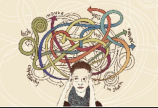Hope for Christians with OCD
Hope for Christians with OCD

Christians with Intrusive Thoughts
Christians with obsessive-compulsive disorder (OCD) may be especially alarmed by intrusive thoughts that involve aggressive, sexual, or religious themes. Various teachings convey that thoughts are important and mean something. For example, Proverbs 4:23 and Matthew 12:34 speak to thoughts and behaviors as originating from the heart, and other verses imply that having a thought is as bad as committing the action (e.g., Matthew 5:21-22 for anger and murder; Matthew 5:27-28 for lust and adultery). This can encourage efforts to suppress and control thoughts (for example, see Abramowitz et al., 2004).
Christians with OCD might start to wonder, “What does it mean about me, that I’m having this thought?” and may wonder if they secretly are, deep down, a pedophile, murderer, or monster.
Scrupulosity OCD
Scrupulosity OCD is an excessive fear or doubt involving religious or moral content, and is not to be confused with normative religious practices. Common themes include fearing if one is doing the right thing, committing a sin, or going to hell. People with scrupulosity might be tormented by these doubts, and may start to engage in behaviors that seek to restore their (perceived) standing with God or alleviate distress. Common compulsions are avoiding situations that trigger OCD (e.g., attending church, Bible-reading), checking to make sure that a sin wasn’t committed, or repeatedly asking for forgiveness or seeking reassurance from pastors or other supports.
What Makes OCD Worse?
People with OCD become anxious from intrusive thoughts because of the implicit belief in the importance of thoughts. The individual engages in anxious behavior (the compulsion) to avoid feeling anxious and to alleviate distress quickly. This produces momentary relief and a sense that they’re okay. However, that “certainty” never lasts for long, and the doubt creeps back in. Fear-based beliefs are reinforced, and next time the intrusions and anxiety come back stronger.
This OCD cycle can be quite hindering for the Christian person’s faith life. They may start to avoid engaging in important areas of their lives, or OCD might hijack their implementation of faith so that it’s not a source of strength and comfort anymore but of feelings of bondage.
However, the very act of avoiding uncomfortable feelings is what drives these symptoms to grow further. This is what makes OCD worse.
The goal of treatment is to break free from the cycles that keep the person feeling trapped so that they can experience the benefits of faith more fully.
Are Christians More Likely to Have OCD?
The short answer is no.
To get more technical, research shows that religious people in general are not more likely to have OCD, and that no particular religious group is more associated with OCD (Siev et al., 2017, Steketee et al., 1991). In other words, Christians are not more likely to have OCD.
However, how religious one is can influence what OCD looks like. There may be more religious or scrupulous themes in the symptom presentation (Siev et al., 2017), and scrupulosity severity may be affected in certain groups (see Buchholz et al., 2019; Witzig Jr. & Pollard, 2013).
Are Intrusive Thoughts Sins?
Everyone has weird, random thoughts; we can’t control these. However, people with OCD think it means something and get alarmed, so they get stuck there.
By definition, intrusive thoughts are ego-dystonic, or inconsistent with who you are, thus distressing. Sins are typically consistent with our desires. If you’re not enjoying a thought, or your intent when purposefully approaching a fear is to overcome it and get your life back, then you’re likely not sinning.
It’ll be more clear if you actually did something wrong. Where there are doubts, that may be an indicator of OCD.
Does God Forgive Intrusive OCD Thoughts?
While I can’t speak for God, if we continue from the above logic, where there’s no sin, then there’s nothing to forgive.
God approaches people from a place of grace, mercy, and love. He is omniscient and knows what you’re going through. Even when we are wrong, God tends to be much more forgiving of us than we are of ourselves.
I wonder if we can borrow some of that compassion.
Treatment for Christians with OCD
It is important to work with a professional experienced in treating OCD using Exposure and Response Prevention (ERP), though there have been additional approaches supported by research. Without a properly trained clinician, symptoms could be inadvertently worsened.
Here are a few tips to get started.
Tip #1
Instead of thinking about the meaning of the intrusive thought and what it says about you, consider what your reaction to the thought means.
If you are repulsed by the thought or image, wouldn’t that be evidence that you are not what you fear (i.e., ego-dystonic)? It’s really not who you are.
Remind yourself of Truths, such as what you know the Bible says about God’s nature or about you, and live that out. Act on your beliefs–the feelings will catch up.
Tip #2
Don’t let #1 become a compulsion! Acknowledge the reality of who you are and remind yourself of Truths, then move on.
If you notice yourself having to say this every time to feel okay, it has become a compulsion. Don’t get into the trap of trying to achieve complete certainty. You won’t ever get it–OCD won’t let you.
But that’s not a reason to let it limit your life. Don’t let it win. There will always be unknowns in life, and we have to learn to live with them.
Tip #3
Don’t make decisions based on fear and avoidance. Rather, see what is most important to you, and act on that. Through the fear. That is courage.
What do you value? What gives you a sense of meaning and purpose? What makes your life fulfilling?
If your family is both a source of OCD fears and it is important for you to be present with your family, approach rather than avoid. Be present with them, re-engage with and appreciate their smiles and laughter, and do the things that you fear. Don’t let OCD rule you.
Waiting around until you feel better to do what you want will lead to a very small, unfulfilling life.
…But nobody said you have to eliminate uncomfortable feelings before you re-engage with life.
To learn more, check out ADAA's patient resource guide, Anxiety and Depression Association of America Patient Guide to Mood and Anxiety Disorders.
This post is presented in collaboration with ADAA's OCD and Related Disorders SIG. Learn more about the SIG.
References:
- Abramowitz, J. S., Deacon, B. J., Woods, C. M., & Tolin, D. F. (2004). Association between Protestant religiosity and obsessive–compulsive symptoms and cognitions. Depression and Anxiety, 20(2), 70–76. https://doi.org/10.1002/da.20021
- Buchholz, J. L., Abramowitz, J. S., Riemann, B. C., Reuman, L., Blakey, S. M., Leonard, R. C., & Thompson, K. A. (2019). Scrupulosity, religious affiliation and symptom presentation in Obsessive Compulsive Disorder. Behavioural and Cognitive Psychotherapy, 47(4), 478–492. https://doi.org/10.1017/S1352465818000711
- Siev, J., Huppert, J. D., & Zuckerman, S. E. (2017). Understanding and treating scrupulosity. In The Wiley Handbook of Obsessive Compulsive Disorders (pp. 527–546). John Wiley & Sons, Ltd. https://doi.org/10.1002/9781118890233.ch29
- Steketee, G., Quay, S., & White, K. (1991). Religion and guilt in OCD patients. Journal of Anxiety Disorders, 5(4), 359–367. https://doi.org/10.1016/0887-6185(91)90035-R
- Witzig Jr, T., & Pollard, C. (2013). Obsessional beliefs, religious beliefs, and scrupulosity among fundamental Protestant Christians. Journal of Obsessive-Compulsive and Related Disorders, 2(3), 331–337. https://doi.org/10.1016/j.jocrd.2013.06.002




















